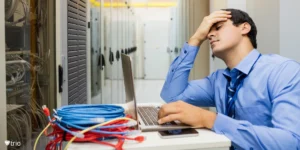Have you ever wondered which protocol gives IP addresses to devices on a network? This process is an essential part of how devices connect and communicate in a network. Without the right protocol, devices would struggle to find and talk to each other.
The protocol responsible for this is called Dynamic Host Configuration Protocol (DHCP). DHCP makes sure every device gets a unique IP address automatically, so you don’t need to set it up manually. In this post, we’ll explore how DHCP works, why it’s important, and how it helps your devices connect smoothly to the internet.
Which Protocol Gives IP Addresses to Devices on a Network? Learn How It Works

Devices on a network need IP addresses to communicate, but have you ever wondered which protocol gives IP addresses to devices on a network? The process is automatic, seamless, and vital for smooth communication. Let’s explore the answer and understand how this protocol helps devices connect easily.
The answer lies in a protocol called Dynamic Host Configuration Protocol (DHCP). DHCP is answerable for relegating novel IP locations to gadgets consequently. This means that every device on the network gets its own address, allowing it to send and receive data without any manual setup.
What Is an IP Address and Why Do Devices Need It
Every device connected to a network needs an IP address. Think about it like a street number however for the web. It helps gadgets find and converse with one another. Without an IP address, devices can’t share data or connect to websites.
IP tends to come in two variants: IPv4 and IPv6. IPv4 is common but shorter, while IPv6 is longer and supports more devices. The protocol that gives IP addresses to devices on a network ensures that each device has a unique address, whether it’s a smartphone, laptop, or smart TV.
DHCP makes this process automatic. It assigns IP addresses temporarily, like borrowing a library book. Once a device disconnects, the IP address goes back into the pool for other devices to use.
How Does DHCP Work to Assign IP Addresses

DHCP makes assigning IP addresses easy and fast. It works in four main steps:
- Discovery: A device joins the network and asks for an IP address.
- Offer: The DHCP server responds with an available address.
- Request: The device accepts the offered IP address.
- Acknowledge: The server confirms and assigns the IP address.
This process happens in seconds, so users rarely notice. It’s like checking into a hotel where the staff assigns you a room number immediately.
Why Is DHCP Better Than Manual Configuration
Manually setting up IP addresses can be a headache. Imagine typing in a long string of numbers for every device. Mistakes can lead to conflicts where two devices share the same IP address, causing connection issues.
DHCP solves this problem by automating the process. It reduces errors, saves time, and ensures every device has a unique address. For businesses with many devices, DHCP is a lifesaver. It also works for home networks, making setup quick and easy.
Common Problems with IP Address Assignment and How DHCP Solves Them

IP address conflicts can happen when two devices try to use the same address. This often leads to connection failures. Another issue is forgetting to update addresses when devices move between networks.
DHCP handles these challenges effortlessly:
- Conflict resolution: It ensures no two devices get the same IP address.
- Automatic updates: When devices connect to a new network, DHCP assigns fresh addresses.
- Time-saving: It eliminates manual entry, reducing errors and saving time for network admins.
With these features, DHCP keeps networks running smoothly without users having to worry about the details.
Conclusion
Understanding which protocol gives IP addresses to devices on a network is important for both beginners and professionals. DHCP is the hero behind the scenes, assigning unique IP addresses to devices quickly and automatically. It keeps networks running smoothly, whether at home, in offices, or on larger scales like schools and businesses.
With DHCP, you don’t have to worry about manual setups or IP conflicts. It’s a simple yet powerful tool that saves time and effort. By learning about DHCP and how it works, you can better appreciate how devices connect and communicate seamlessly every day.
FAQs
Q: What protocol gives IP addresses to devices on a network?
A: Dynamic Host Configuration Protocol (DHCP) assigns IP addresses to devices automatically.
Q: Why is DHCP important for networks?
A: DHCP makes it easier to connect devices by assigning unique IP addresses automatically, saving time and preventing errors.
Q: Can devices work without an IP address?
A: No, devices need an IP address to communicate and share data on a network.
Q: How do I check if my network uses DHCP?
A: Go to your device’s network settings. If the IP configuration says “Automatic” or “DHCP,” it’s using DHCP.
Q: What happens if two devices have the same IP address?
A: This creates an IP conflict, and both devices may lose their network connection. DHCP prevents this by ensuring unique addresses.
